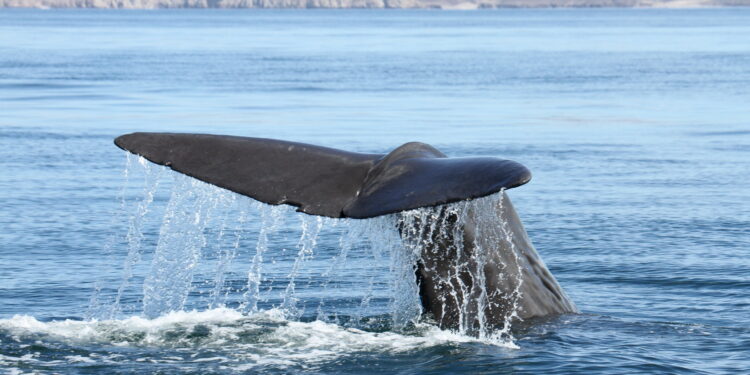Credit: Hector Pérez-Puig, CC BY
A PeerJ A study has revealed that a significant departure of sperm whales (Physeter macrocephalus) from the central part of the Gulf of California is linked to the collapse of the population of giant squid (Dosidicus gigas), their main prey.
The study, led by researchers Msc. Héctor Pérez-Puig and Dr. Alejandro Arias Del Razo provide insight into the relationship between large marine predators and their environment, highlighting sperm whales as key indicators of ocean health.
The research, conducted over a 9-year period in the eastern Midriff Islands region of the Gulf of California, used extensive survey data and photo-identification techniques to track sperm whale populations. The results indicate a striking correlation between the decline of the giant squid and the disappearance of sperm whales from the region, with no sightings recorded between 2016 and 2018.
Main conclusions:
- Population decline: Between 2009 and 2015, the sperm whale population in the central Gulf of California ranged from 20 to 167 individuals, with a total “super population” of 354 whales. However, from 2016 to 2018, sperm whale sightings stopped completely.
- Impact of giant squid collapse: general additive models show a positive relationship (R2 = 0.644) between sperm whale sightings and giant squid landings, indicating that as squid populations declined, sperm whales left the area.
- Environmental factors: The decline of both species is attributed to environmental changes, including sustained ocean warming and intensified El Niño events, which have altered the dynamics of the Gulf of California ecosystem. The giant squid population has been particularly hard hit, showing a shift towards smaller phenotypes, which may no longer feed larger predators like sperm whales.
Ecosystem implications
Sperm whales, as apex predators, play a crucial role in controlling energy flows within marine ecosystems. Their departure from the Gulf of California suggests broader changes in the ecosystem and raises concerns about the long-term health of the region. The study highlights the importance of collecting long-term data to understand population trends and the effects of climate change on marine species.
Lead author Héctor Pérez-Puig highlighted the findings’ broader ecological implications: “The departure of sperm whales from the Gulf of California serves as a sentinel signal, reflecting significant changes in marine ecosystems. As the environment changes, so does the delicate balance. between predators and prey. »
The study requires more detailed analysis to fully understand the movements of sperm whales and their prey, particularly in light of the ongoing “tropicalization” of the Gulf of California. Researchers recommend ongoing monitoring to assess the impact of environmental changes on marine species and overall ecosystem health.
This research makes a vital contribution to the field of marine biology and ecology, with implications for the conservation of sperm whales and the broader marine environment in the Gulf of California.
More information:
The departure of sperm whales (Physeter macrocephalus) in response to the decline in the population of giant squid (Dosidicus gigas) in the central Gulf of California. PeerJ (2024). DOI: 10.7717/peerj.18117
Journal information:
PeerJ
Quote: Departure of sperm whales linked to the decline of the giant squid population in the Gulf of California (October 8, 2024) retrieved October 8, 2024 from
This document is subject to copyright. Except for fair use for private study or research purposes, no part may be reproduced without written permission. The content is provided for informational purposes only.



